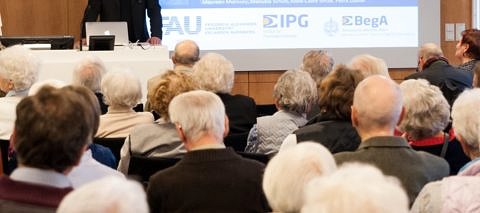New project at the Institute for Psychogerontology: Overcoming loneliness, isolation and social exclusion in old age
The Institute for Psychogerontology is launching a new project to strengthen the social participation of older people, receiving a grant of 395,000 euros from the Theo and Friedl Schöller Foundation. The project will start on 1 January 2021.
Many older people suffer from social isolation or loneliness. It has been proven time and again that good social contacts and relationships contribute decisively to better health, healthy behaviour and increased activity.
In the research project ” Gesundheit und soziale Teilhabe (GesTe)” (Health and Social Participation), newly funded by the Theo and Friedl Schöller Foundation from January 2021, researchers from the Institute of Psychogerontology at the Friedrich-Alexander University are investigating how social participation and thus health and well-being can be promoted in old age.
Numerous research findings are available on the main causes of loneliness, isolation and social exclusion. For example, physical limitations, the loss of a partner, relative or friend, but also individual experiences during one’s life and developments in society as a whole such as increasing digitalisation, can lead to a decrease in social contacts and a feeling of social exclusion. The project “BegA Beratung für gesundes Altern” (Counselling for healthy ageing), funded by the Theo and Friedl Schöller Foundation in the funding period 2016 – 2020 also demonstrated the central importance of a good social network and thus a good quality of relationships for maintaining the joy of life, the will to live and the quality of life in old age.
How can social participation in old age be strengthened?
For the project, detailed individual interviews with the study participants were conducted to record and document individual reasoning, life situations and preferences. Based on this knowledge, the counsellors can then work in close cooperation with the people concerned and their environment to improve social participation through various interventions. These interventions aim at three aspects: (a) the reactivation and deepening of former or existing relationships, (b) strengthening of positive relationship experiences made in exchange with other people, and (c) psycho-educational training and information on the health-promoting effects of social relationships.
What are the scientific objectives of the GesTe project?
The main focus of the project is the development of novel intervention approaches to strengthen social participation in old age and their scientific review and evaluation.
In addition, students and doctoral candidates in Gerontology and Psychogerontology are trained and further qualified in a practical and application-oriented manner through their participation in this project. Through direct contact with older people, students receive a comprehensive, unprejudiced view of old age(s) under professional guidance.
